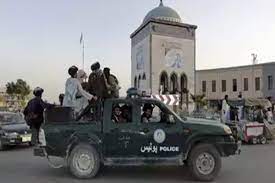UNITED NATIONS, Nov 18: India said that prior to the takeover of Afghanistan by the Taliban, New Delhi had been implementing developmental and capacity-building projects in the war-torn country with a commitment of over three billion dollars but the change in the political situation has resulted in slowing down of its projects “for different reasons.”
The statement was made by the Counsellor in India’s Permanent Mission to the UN R. Madhu Sudan. He said in the UN Security Council Arria Formula Meeting by Russia on the economic challenges facing the people of Afghanistan.
“It may be noted that prior to the takeover by the Taliban, India had been implementing projects and programmes with a commitment of over three billion dollars aimed towards development, reconstruction, and capacity building in Afghanistan,” Sudan said.
Sudan said India’s development partnership encompassed people-centric projects in all 34 provinces of Afghanistan and were aimed at making Afghanistan a self-sustaining nation. India also operationalised air freight corridors and the Chabahar Port to enhance regional connectivity to Afghanistan.
“However, the change in the political situation has resulted in slowing down of our projects for different reasons. Nevertheless, India’s unwavering commitment towards helping the people of Afghanistan remains unchanged,” he said.
The Taliban took control of Kabul on August 15, 2021, and several hard-won rights over the last two decades, especially those for women, children and minorities, have been reversed since then under the new regime.
He said India is closely monitoring the security situation in Afghanistan and is actively engaged with the international community on issues related to Afghanistan.
“In the recent past, terrorist attacks have targeted public spaces like places of worship and educational institutes, especially of minorities. This is a concerning trend and India strongly condemns the targeting of innocent civilians. The attack at the diplomatic premises of the Russian Federation is highly condemnable,” he said.
India said it is important to recognise that the international community continues to have some concerns regarding the situation in Afghanistan. India’s main priorities in Afghanistan include providing immediate humanitarian assistance for the Afghan people, formation of a truly inclusive and representative government, combating terrorism and drug trafficking and preserving the rights of women, children, and minorities.
He noted that the collective approach of the international community has been articulated by the Security Council Resolution 2593, adopted under India’s Presidency of the Council in August 2021. The resolution unequivocally demands that the territory of Afghanistan should not be used for sheltering, training, planning, or financing terrorist acts, specifically terrorist individuals and entities proscribed by the UN Security Council, including Lashkar-e-Taiba and Jaish-e-Mohammad.
“Linked to the issue of terrorism is the menace of drug trafficking. We have recently seized big shipments of drugs at our ports and in the high seas off our coasts. It is important for strengthening international cooperation to disrupt and dismantle these trafficking networks,” he said.
On the political front, he said India continues to call for an inclusive dispensation in Afghanistan which represents all sections of the Afghan society.
“A broad-based, inclusive, and representative formation is necessary for long-term peace and stability in Afghanistan, and in turn, for economic recovery and development,” he said adding that peace and security in Afghanistan are critical imperatives that “all of us need to collectively strive for.”
Voicing India’s deep concern at the unfolding humanitarian situation in Afghanistan, Sudan said that in response to the humanitarian needs of the Afghan people and in response to the urgent appeals made by the United Nations, India has dispatched several shipments of humanitarian assistance to Afghanistan.
These include 40,000 MTs of wheat, about 50 tonnes of medical aid consisting of essential lifesaving medicines, anti-TB medicines, 500,000 doses of COVID vaccine, essential medical/surgical items and 28 tons of other disaster relief material. These aid consignments were handed over to the Indira Gandhi Children Hospital, Kabul, the Afghan Red Crescent Society (ARCS) and other UN specialised agencies including WFP and UNOCHA.
He said in order to closely monitor and coordinate the efforts of various stakeholders for the effective delivery of humanitarian assistance and in continuation of India’s engagement with the Afghan people, an Indian technical team has also been deployed at New Delhi’s Embassy in Kabul.
He underlined that India has direct stakes in ensuring the return of peace and stability to Afghanistan, given India’s position as a contiguous neighbour and long-standing partner of Afghanistan, as well as its strong historical and civilizational linkages to the Afghan people.
“Our approach to Afghanistan, as always, will be guided by our historical friendship and our special relationship with the people of Afghanistan,” he said. (PTI)
Trending Now
E-Paper


